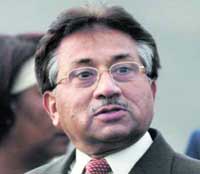Pakistan expresses concern at US, India civilian nuclear deal
Pakistan should have been included in talks that resulted in the United States agreeing to provide India with civilian nuclear fuel, to prevent an atomic arms race between the two rivals, Pakistan's political and military leaders said Thursday.

President Gen. Pervez Musharraf held a regular meeting Thursday with the National Command Authority - a committee of top military and government officials and scientists that controls Pakistan's nuclear and missile program. The U.S.-India deal struck last week was among topics discussed.
Officials in Washington announced last Friday the United States and India had worked out a plan to share civilian nuclear fuel and technology, but there would be safeguards that prevented India from using U.S. material to build atomic bombs.
The Pakistani authority said in a statement after its meeting the U.S.-India deal would have "implications on strategic stability" because it would "enable India to produce significant quantities of fissile material and nuclear weapons from unsafeguarded nuclear reactors."
"The objective of strategic stability in South Asia and the global nonproliferation regime would have been better served if the United States had considered a package approach for Pakistan and India ... with a view to preventing a nuclear arms race in the region," the statement said.
Such an approach should have "promoted restraints while ensuring that the legitimate needs of both countries for civil nuclear power generation are met," it said.
Pakistan, a key ally of the United States in its war on terror, opposed the U.S.-India nuclear deal for months while talks were underway. Thursday's condemnation was among the strongest yet from Pakistan.
Under the U.S.-India nuclear deal, Washington would not allow New Delhi to carry out nuclear tests. However, it allows the United States to ship nuclear fuel and technology to India, which in exchange would open its civilian nuclear reactors to international inspectors.
Nicholas Burns, the chief U.S. diplomat at the talks, told reporters last week the international inspections would prevent fuel from being used to build nuclear weapons in India.
India, with whom Pakistan has fought three wars after gaining independence from Britain in 1947, built its bombs outside the Nuclear Nonproliferation Treaty, which provides civil nuclear trade in exchange for a pledge from nations not to pursue nuclear weapons.
Pakistan became a declared nuclear power in 1998 in response to India's underground nuclear tests. One of Pakistan's top nuclear scientists, A.Q. Khan, has been under house detention since 2004 for running a black-market in weapons technology that supplied countries including Iran, Libya and North Korea.
The U.S.-India deal is yet to be approved by international regulatory bodies and faces a review by Congress.
Subscribe to Pravda.Ru Telegram channel, Facebook, RSS!





